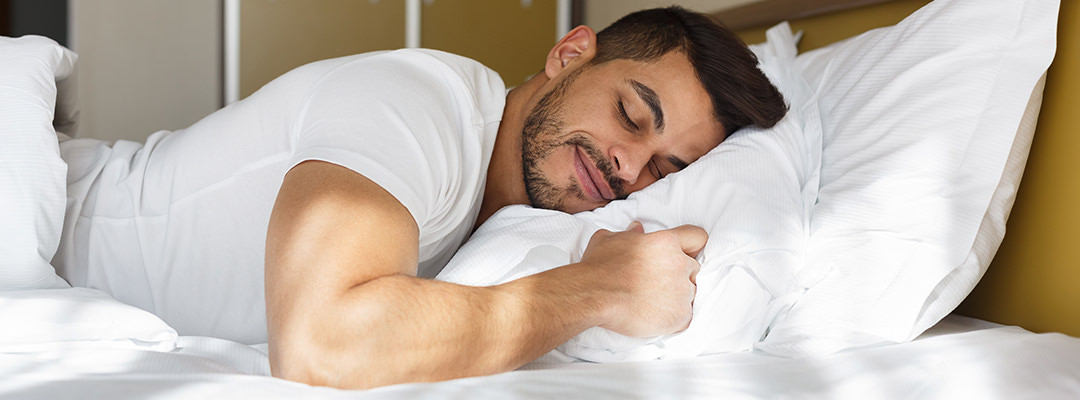We know. Sleep is supposed to be your safe place. The time when you finally set down all your daytime worries for some hard-earned R&R — not to mention some mending of the stress you’ve been putting on your bones and muscles throughout the day. And now researchers are saying your sacred sleep time might actually be hurting you? What gives?
The human body is a pretty complex thing, and its vast array of interconnections means that it’s pretty easy for something to go wrong. Sleep is so incredibly important to every aspect of our physical and mental health, but if it’s done incorrectly it can do as much harm as good. Let’s look at what happens to our bodies when we sleep and why the right sleeping position is so essential.
What Happens When We Sleep?
It may look like nothing’s happening while we’re sleeping, but the reality is that our internal systems are going into overdrive. Our brains deal with the influx of information it’s collected over the course of the day, and regulate a series of hormones including cortisol, melatonin, and growth hormones that promote the development of muscles and bones. Our immune system also kicks in, releasing proteins that fight infections and inflammations.
In order for all these systems to function properly, we need to be getting the most restful, consistent sleep possible. When we sleep poorly, these systems don’t function at their absolute best and we can suffer a lot of health repercussions as a result.
Is Sleeping on Your Stomach Bad for You?
Afraid so. There has been some confusion about sleeping on your stomach because it’s been said — with some truth — that it helps clear your air passageways and alleviates snoring. Unfortunately, this is an instance where the bad outweighs the good; here are a few of the reasons why sleeping on your stomach isn’t a great idea.
You Can Damage Your Spine
Since most of our body weight is stored in our stomach, sleeping on our fronts drags our spin downwards and makes it difficult to maintain a healthy spinal position. Your back begins to arch inwards, which stretches your spine out of its natural alignment. When this is done continuously it can become more and more difficult to pull it back into the shape it needs. People who sleep on their stomachs often experience chronic pain in their backs.
What’s more, your spine serves as the highway to a range of other nerves in your body. In addition to pain in your back, sleeping on your stomach and abusing your spine in this way can also trigger pain pretty much anywhere including the head, neck, and shoulders.
You Can Develop Problems in Your Neck
In addition to sore neck muscles as a result of spine damage, sleeping on your stomach can further damage this area due to the way you’re holding your head when you sleep. Unless you’re sleeping with your face straight down into your pillow (hint: don’t do this. You’ll die.), you’re probably holding your neck at an unnaturally sharp angle. This can cause your neck and spine to shift out of alignment — people who sleep on their stomachs often report increased difficulty in turning their head to one side as opposed to the other.
In extreme cases, this can even lead to what’s called a “herniated disk”, which is when your vertebrae shift enough to rupture the gelatinous material in your neck. This causes serious problems and needs professional medical treatment.
You Can Mess Up Your Beautiful Face
Considering how many billions upon more billions the beauty industry invests each year into making us buy their products, it’s amazing to think that we could be undoing a lot of their benefits simply by sleeping on our stomachs.
When we sleep on our stomach, we put a lot of stress on the skin of our face by pushing and pulling it as we move in our sleep. This damages the elasticity of our skin and aids in forming wrinkles. Plus, it keeps our skin in near-constant contact with our pillowcase, which is a hotspot for dirty skin oils and bacteria. Sleeping on your stomach with your face down is likely to lead to uneven skin tone and breakouts.
You Can Mess Your Pillow While Drooling
The act of sleeping on one’s stomach can trigger drooling for a few reasons. For one, gravity pulls the saliva down from the mouth and onto the pillow. Secondly, when someone is lying on their stomach, their head is often turned to the side, which can block the saliva ducts and cause them to overflow. Finally, lying on the stomach can put pressure on the saliva glands, causing them to produce more saliva than usual.
But What If I Want to Stop Snoring?
You may have heard that sleeping on your stomach is a good way to stop snoring at night and prevent sleep apnea (interruptions in breathing while you sleep). There is some fact behind this fiction, but sleeping on your stomach comes with a whole host of other problems, so it’s best to find another way to deal with your snoring if you can.
Limit Alcohol Intake
Alcohol before bed is one of the biggest culprits of nighttime snoring; it relaxes the muscles in the back of your throat. People who don’t normally snore will often snore after an evening of drinking, and if you’re a regular snorer alcohol will make it even worse.
Keep Your Sleeping Space Dust-Free
Dust particles are another thing that can exacerbate snoring — whether that’s dust accumulated on your pillowcase, dust being dispersed through the air off a ceiling fan, or voyaging on the backs of furry animal companions. If you have a ceiling fan, do your best to keep it clean; wash pillowcases regularly; and, if you can stand it, keep your immediate sleeping area a pet-free space.
Check Your Weight Gain
Snoring affects both slim and not-so-slim people, but if you find that you’re snoring when you never used to, a sudden change in your weight may be the culprit. Make sure you’re taking care of yourself, eating well, and staying active.
Consult Your Doctor
If none of these methods are working for you, don’t be tempted to try sleeping on your stomach — instead, talk to a medical professional and see if they can prescribe snoring aids like nasal strips or other medication.
Which Sleep Position Is Best?
So if sleeping on your stomach at night is bad news all around, which position is healthiest? Sleeping flat on your back is the best position for keeping your spine aligned — it provides solid support for your back and helps maintain your spine’s natural shape.
This works best if you use a pillow that keeps your head aligned with your back as much as possible; if your head is too low or raised up too high above your spine this can cause problems in your neck too. Most people who sleep on their backs naturally gravitate to pillows that keep their necks properly aligned as this is naturally the most comfortable back sleeping position.
The other option is sleeping on your side. This is definitely better for those of us with snoring or sleep apnea problems since it keeps those airways more open. It’s not always the best for your spinal position, but it’s worlds better than the effects of sleeping on your stomach. As a bonus, sleeping on your side actually helps with supporting your digestive system.
If you experience any kind of gastro-reflux disease, however, you may find you experience some discomfort as a result of sleeping on the right side of your body. People with these conditions, as well as pregnant women, may prefer to sleep mostly on the left side. However, switching back and forth from one side to the other works well for most people.
How to Train Yourself to Sleep Better
Breaking a habit is never easy, and it becomes even harder when you don’t even get to be awake for it. That being said, it is possible to train yourself to stop sleeping on your stomach and begin sleeping on your back or side instead.
Try using a pillow that keeps your head suspended a little higher, and see if you can get a long, full-body pillow or a rolled-up blanket to lay against your side. That way, once you fall asleep in your new favorite sleeping position, the obstruction will make it more difficult to turn over and roll back onto your stomach.
If you’re still finding it uncomfortable to sleep any other way, the problem might be with your mattress. Many people with very stiff mattresses may find themselves turning onto their stomachs because the hard mattress surface digs into their back and shoulders. If you think this might be the case, try out a softer mattress and see if that helps. Many mattress companies have generous trial periods, so you can see if it helps your sleep position without making a quick commitment.
We all know that a good night’s sleep is essential to maintaining our health in every area of our life. The position you sleep in can have a huge impact on the quality of your sleep and the health benefits you get out of it — and the wrong position can even cause permanent damage. Fortunately, now you know a few tips and tricks to make sure you get the best possible benefits out of your sleep.





